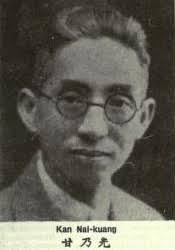Li Chi-shen (1886-9 October 1959), commander of the Fourth Army (1925-26) who served during the Northern Expedil^ion as governor of Kwangtung, military affairs commissioner, and acting president of the Whampoa Military Academy. He became the top-ranking military and political officer at Canton. He later participated in several movements which opposed Chiang Kaishek. After being expelled […]









